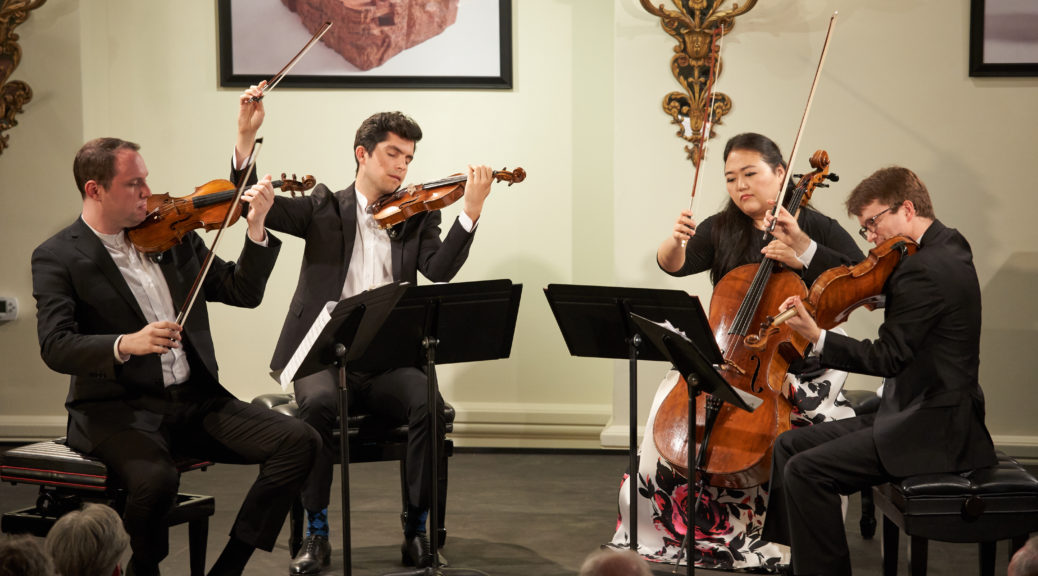
ANTON WEBERN: DOING IT HIS WAY
ATHERTON, CA—The Music@Menlo chamber-music festival fills a major summer void in concerts with players from all over who are downright virtuosic.
The three-week cornucopia of performances, now in its 16th season, draws robust crowds to intimate venues, some more suitable acoustically than others. This year’s format for the (mostly) 18th and 19th century music has each concert focusing on a single European arts capital. Vienna got the call on July 19, with works of Webern, Haydn and a master named Beethoven. Other nights take on music from St. Petersburg, London, Budapest, Berlin, Paris, and Leipzig, allowing audition of rarities and favorites alike.
This is the off-season occupation of co-directors/musicians David Finckel and Wu Han from New York, who can import talent from eastern locales to amplify the West Coast mode.
The July 19 concert featured the Calidore String Quartet, leading the new wave of stellar chamber players emerging on the international scene, with average age about 30. Initially formed in the Los Angeles area, this elite foursome has already earned the top prize in some seven different competitions, including the M-Prize at the University of Michigan, with a whopping $100,000 award.
In two short bursts, they showed the remarkable stylistic transformation of young Anton Webern from 1905 to 1909. The first, the “Langsamer Satz,” was decidedly 19th century and much influenced by Richard Strauss; the second, “Five Movements,” had transitioned to his fully mature atonal style, reflecting the real world that was going very much awry at that time. If the first suggested a perfect stained-glass window, the second was a collection of shards that could cut and wound. There are disjoint phrases, subterranean trills, harmonics, and leaps from very loud to very soft; consonance has given way to dissonance as a new way of life, with new-era disillusionment added. The new Webern expressiveness reminded one of the famous Churchill quote: A riddle wrapped in a mystery, inside an enigma.
His work awakens your fantasies in a way that some might find disturbing. These are tornados running wild rather than the comforting summer-vacation musical breezes one might expect. He calls up rather askew images from your innermost mind, telling you: Now you’re on your own. And the terse Five Movements end abruptly after just 12 minutes, without so much as a cadence.
The Beethoven Quartet, Op. 59 No. 3 (“Rasoumovsky”), is a major, vigorous piece, 33 minutes long, with structure and sonata form evident. The high-energy work has its share of surprises, including a false ending (a pregnant pause, then a coda). What always astonishes in the finale is the “buzzing-bee” music played solo by each instrument, one at a time. The furiously paced buzzing filigree gives way to a sudden, vehement chord—the sting. Yet they all manage to live happily ever after.
The Calidore ensemble carried off its many challenges to the max.
The concert opened with the Haydn Quartet, Op. 54, No. 1, which was composed not in Vienna but during an extended stay in Paris.
MUSIC NOTES—The fest uses two eye-popping sites: The larger Center for the Arts at Menlo-Atherton High school, and the 148-seat Spieker Ballroom of the ornate Stent Hall, Menlo School, Atherton a few blocks away. The latter is visually stunning, but with too resonant an acoustic to show off a crack string quartet to best advantage. The sound at the 492-seat Center however is beyond reproach.
Beneath the crown of virtuosic concerts, Music@Menlo provides a summer seminar for advanced chamber players, featuring both master classes and free public performances.
The Austrian composer Webern (1883-1945) wrote finely crafted miniatures; his entire musical output runs to only about two hours in performance. He remains both a misunderstood and tragic pioneer of new music—When he ventured outdoors late to smoke a cigarette late at night months after the war’s end, despite the curfew, an occupation soldier spotted the light and shot him dead.
Music@Menlo, a chamber music festival, through Aug. 4, in Atherton and Menlo Park, CA sites. For info: (650) 331-0202, or go online.